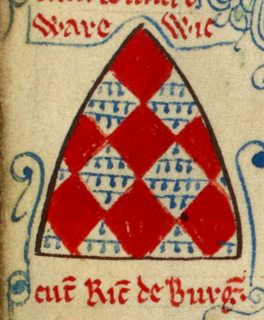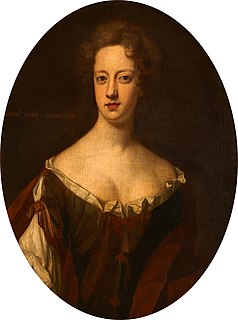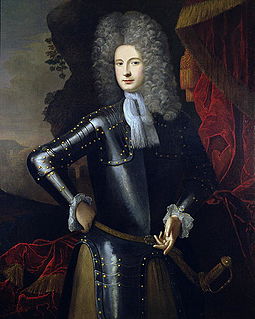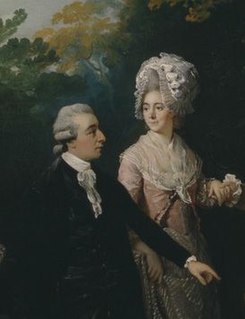Related Research Articles

Earl of Gosford is a title in the Peerage of Ireland. It was created in 1806 for Arthur Acheson, 2nd Viscount Gosford.

Viscount Bangor, of Castle Ward, in the County Down, is a title in the Peerage of Ireland.

Richard Mór de Burgh, 1st Lord of Connacht, was a Hiberno-Norman aristocrat and Justiciar of Ireland.
Claud Hamilton, 2nd Baron Hamilton of Strabane was the founder of the Strabane branch of the Hamiltons. He died relatively young at about 32 and his wife, Jean Gordon, married Phelim O'Neill, one of the leaders of the 1641 rebellion, after his death.

Michael Ward was an Irish politician and judge.

Henry Dillon, 8th Viscount Dillon fought for the Jacobites during the Williamite War in Ireland, was attainted but obtained the reversal of the attainder in 1696.
Christopher Plunket, 2nd Earl of Fingall and 11th Baron Killeen was an Irish politician and soldier. In 1641 he negotiated with the rebels on behalf of the Old English of the Pale and pushed them to join the rebellion. He fought for the rebels at the siege of Drogheda. He joined the Confederates and fought in its Leinster army, among others at Dungan's Hill. When the Confederates fused in the Royalist Alliance, he fought under James Butler, 1st Duke of Ormond in the Battle of Rathmines where he was wounded and taken prisoner. He died of his wounds two weeks later in captivity at Dublin Castle.

Edward Bourchier, 4th Earl of Bath.

The Buckworth, later Buckworth-Herne, later Buckworth-Herne-Soame Baronetcy, of Sheen in the County of Surrey, is a title in the Baronetage of England. It was created on 1 April 1697 for John Buckworth, High Sheriff of London in 1704. The second Baronet sat as Member of Parliament for Weobley. The third Baronet was Assistant Gentleman Usher to George II. The fifth Baronet was Gentleman-Pensioner and Exon of the Guard during the reign of George III. He married Anne, daughter of Paston Herne, of Haveringland Hall, Norfolk, and assumed by Royal licence the additional surname of Herne. The sixth Baronet assumed in 1806 by Royal licence the additional surname of Soame in compliance with the will of Sir Peter Soame, 4th Baronet, of Thurlow. The ninth Baronet was a member of the Shropshire County Council.
Nicholas Ward, 2nd Viscount Bangor, styled The Honourable from 1770 until 1781, was an Irish politician and peer.
Edward Ward, styled The Honourable from 1770, was an Irish politician.
Col. Robert Ward PC (Ire), styled The Honourable from 1770, was an Irish politician and colonel of the South Down militia.
Edward Michael Ward was an Anglo-Irish diplomat.

Bernard Ward, 1st Viscount Bangor, was an Irish politician and peer.
Sir Tristram Beresford, 1st Baronet was an Irish soldier and politician. He was the ancestor of the Marquesses of Waterford, the Barons Decies and the Beresford baronets, of William Beresford, 1st Viscount Beresford and Charles Beresford, 1st Baron Beresford.
Marcus Beresford, 1st Earl of Tyrone, known as Sir Marcus Beresford, 4th Baronet, until 1720 and subsequently as The Viscount Tyrone until 1746, was an Irish peer, freemason and politician.
Charlotte Jemima Henrietta Maria Paston, Countess of Yarmouth was one of the many acknowledged illegitimate children of Charles II of England.
Joseph Deane Bourke, 3rd Earl of Mayo was an Irish peer and bishop who held high offices in the Church of Ireland.
Nicholas Greaves, D.D. (1605?–1673) was an English churchman who was Dean of Dromore cathedral, County Down.

Charles Peter Layard, F.R.S., D.D. was Dean of Bristol from 1800 until his death.
References
- ↑ Brydges, Sir Egerton (1817). A Biographical Peerage of the Empire of Great Britain. London: Bensley and Son. p. 261.
- ↑ Francis Joseph Bigger, ed. (1906). Ulster Journal of Archaeology. Vol. XII. Belfast: McCaw Stevenson & Orr Ltd. p. 138.
- ↑ "ThePeerage" . Retrieved 16 August 2009.
- 1 2 Lodge, John (1789). Mervyn Archdall (ed.). The Peerage of Ireland or A Genealogical History of the Present Nobility of that Kingdom. Vol. VI. Dublin: James Moore. pp. 69–70.